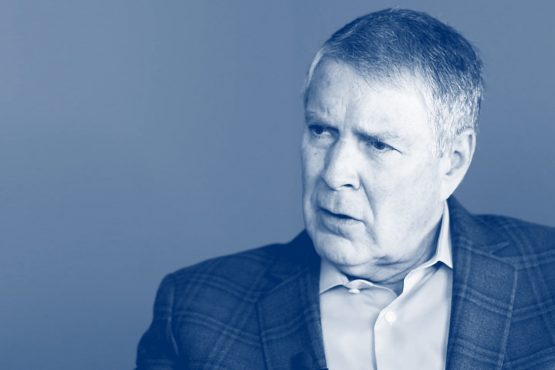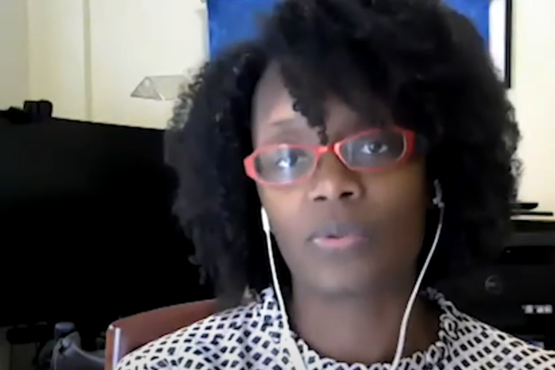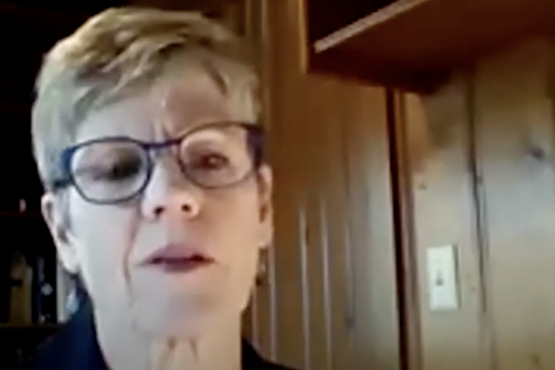Brian Castrucci is the President and CEO of the de Beaumont Foundation, a philanthropic organization focused on improving health at the community level by investing in tools, partnerships, policies, and the public health workforce. Brian is an award-winning epidemiologist who shares with us why it is vital to invest in our public health infrastructure in the midst of the COVID-19 pandemic.
Brian Castrucci: Funding for governmental public health has been repeatedly cut and because of that we didn’t have the necessary staff or supplies in place when this started. And it really slows the response and it means that we’re always playing catch-up and really with each cut to public health, we are taking a greater risk with our nation’s health and we’re really seeing that risk come to play right now.
Senator Bill Fr…: You’re listing to A Second Opinion, your trusted source engaging at the intersection of policy, medicine and innovation and rethinking American health. Brian Castrucci is the President and CEO of the de Beaumont Foundation, a philanthropic organization focused on improving health at the community level by investing in tools, partnerships, policies, and the public health workforce. Brian is an award-winning epidemiologist who shares with us why it is vital to invest in our public health infrastructure in the midst of the COVID-19 pandemic. I’m your host, Senator Bill Frist. Welcome to A Second Opinion.
Senator Bill Fr…: Brian, it’s great to talk to you and I hope that you and your family are doing well and at home, but thanks so much for being with us today.
Brian Castrucci: Thanks Senator. This is just a real honor and family’s doing well. We’ve been pretty fortunate.
Senator Bill Fr…: Brian, thanks so much for your team’s support at our efforts at NashvilleHealth. It has just been tremendous and that sort of collaboration is what makes dreams come to reality. For so many years de Beaumont has worked to shine a spotlight on public health infrastructure in cities like Nashville and beyond. And I am hugely impressed. Share with us a little bit about why that is so important, especially now.
Brian Castrucci: So at de Beaumont, we really seek to create communities where people can achieve their best possible health. And we firmly believe that public health is a critical component of that. In normal times, public health workers are in the community, they’re immunizing children, they’re preventing disease, they’re making sure our food and water are safe. And then during times, like at this pandemic, they are tracing outbreaks. They’re doing the testing, they are really part of our frontline first responder workforce when people become ill.
Brian Castrucci: But I think it’s now become very clear that we weren’t maybe as prepared as we could have been. Over the past decade, funding for governmental public health has been repeatedly cut and because of that, we didn’t have the necessary staff or supplies in place when this started. And it really slows the response and it means that we’re always playing catch-up and really, with each cut to public health, we are taking a greater risk with our nation’s health. And we’re really seeing that risk come to play right now.
Senator Bill Fr…: Brian, we just celebrated Public Health Week in this country, just last week, but unfortunately the thousands and thousands of men and women working in public health every day simply just don’t get noticed. They go unnoticed. Why does it take a crisis like what we’re going through today, so painful, but why does it take a crisis for us to recognize this important contribution?
Brian Castrucci: Well, I mean, I think we clearly knew to do a much better job at marketing public health to the general population. That’s one of the reasons we’ve joined with 18 other public health organizations to launch the website, whypublichealthmatters.org. It actually creates a platform where public health workers can share their stories via video about the work that they’re doing in the COVID-19 response. In a crisis like this, there’s always a few public health professionals who get attention and recognition, but that’s really much more the exception rather than the rule. Many people don’t know what public health workers do and that’s not really surprising. I mean, think about when children are playing, they pretend to be physicians or nurses or teachers or policemen. I have rarely seen a child pretend to be an epidemiologist or a public health director. And if people don’t know what public health is, they really won’t value it.
Brian Castrucci: And sadly, there’s also just a general negative view of government right now. And Americans also tend to understand health through an individual lens and so much more as a medical issue. And that’s why so many discussions of health quickly become about pills and procedures rather than about the policies and partnerships that really support good community health. I think the truth is, is that governmental public health supports a better quality of life, thriving communities, a strong economy. And for our current situation, if we had a fully funded, coordinated public health system, this didn’t have to be as bad as it turned out.
Senator Bill Fr…: We have found in Nashville, but really all over the country that all communities have these silos of groups working on their own, working independently rather than having that first step be a collaborative approach. Yet the health of our public, we know has to be a team sport and not just among the health professionals. As you mentioned, partnerships, business, government, nonprofits, all have got to be at the table. Can you talk a little bit about how important this community-wide connectivity is especially in times like today of crisis? And I guess also why is this needed to respond effectively to the pandemic we have today and then what we’re all looking forward to and that is to begin reopening the economy?
Brian Castrucci: So as much as a strong public health workforce is needed for communities to achieve their optimal health, we also need partnerships and partnerships between groups that don’t always work together or even speak the same language. But just try to name me anything that you can achieve if people aren’t healthy. If you want more parishioners to come to Sunday service, they need to be healthy to get there. If you want employees to be productive, they need to be healthy. If you want your children to succeed in school, they need to be healthy. And that’s why businesses and schools and other organizations need to work together to make their communities healthier.
Brian Castrucci: Community health, it’s like the foundation of our house. It’s something you really don’t think about until something goes wrong and there’s a problem and then you think a whole lot about it. And I think right now everyone who wants to reopen the economy to have a thriving, economically vital community that can attract businesses and new residents, they have a stake in improving health. And until we see health as foundational in our communities, we’re not going to invest the necessary resources for us to have the health that we need in our nation.
Senator Bill Fr…: Brian, as I travel around the data, people are always coming back to data. We need the data and I think as a society we expect timely, real-time health data and a real-time network of health resources out there. Yet during this pandemic, during our crisis today, we’ve seen, not a total, but almost a total data breakdown. There’s confusion about testing available. The PPEs, the masks, the real-time results. It seems so chaotic. How can we create a true digital exchange of information around health?
Brian Castrucci: Well, I mean think about when you go to your physician yourself Senator, you know the vast information that we have on each of us as individuals in a clinical setting. I mean, we’re to the point now that we’re looking at an individual’s genetic makeup to decide what pills to prescribe to them, but our public health data infrastructure is still using leeches, if you use the analogy. We have to modernize our data infrastructure and this pandemic has shown us that we need to do a better job of collecting and sharing information. And the worst part is it’s not a tech issue. I will Google shoes and for the next, any website I go is selling me shoes. So if you can do that, you can’t say that we don’t have the technology, it’s about the will and the investments that we’re trying to make in our data infrastructure.
Brian Castrucci: I mean, imagine, we have moved clinical care to electronic medical records, but we left public health behind. There really isn’t good data sharing between hospital electronic medical records and public health. But that would be an amazing boon to the surveillance capacity that we have in this nation. And I mean, imagine what we would do with data on COVID-19 around race or occupation. I mean, we need that information to inform our policy so that we’re making the right choices. And in a lot of ways, without that data, we are flying blind. So you have a novel virus that already has us kind of behind the eight ball because we don’t know as much about it as we’d like. And then we have a data system that is lagging the information that we need to do the best we can to make the right decisions. And our lack of real-time data and surveillance has made understanding the dynamics of this outbreak extremely hard and has made our response even slower.
Senator Bill Fr…: Brian, I think our realization of that, the absolute importance of data, good data, accurate data, scientific data, and then the appropriate distribution of that data with ongoing surveillance is absolutely critical. I do think our sacrifices are making a huge difference. And I say that knowing that what’s going on today and the response of shutting things down and social distancing and physical distancing has been hugely impactful and painful, disproportionately so on vulnerable populations. But ultimately all of these sacrifices being made, I’m confident are making a huge difference. And ultimately we will win this battle. But how can we benefit from this extraordinarily difficult moment in time and lead it to sort of focus our collective strength and ultimately achieve better health for everybody, including those most vulnerable?
Brian Castrucci: So the first thing is we need to value public health and invest in it accordingly. I mean, right now in this nation, on average, we spend about $13 per person on public health compared to $11,000 per person on medical care. And so, we really need to find the courage to invest and invest longterm in public health. We also can’t just stop at infrastructure funding. We need to invest in our people, in our state and local governmental public health workforce. Our nation’s health departments are already chronically understaffed. And there has been surveys that have shown that half of that workforce say they’re leaving by 2022. So we have a critical workforce shortage in our nation’s public health departments. So we need to look at loan repayment programs, training and other actions that’ll help us attract and retain a strong public health workforce and avoid the possible mass exodus that may be coming.
Brian Castrucci: We also need to learn from this current pandemic to make a lasting change. Your piece in roll call, calling for consistent public health funding was amazing and there’s always that renewed sense of urgency around public health during times of crisis. H1N1, Ebola and also natural disasters. But as the disease rates decline often does the commitment to fund public health. And so we have to have the courage and the leadership to hold the line and fund public health. When this is over, there are going to be any number of people who are lining up for bailouts. And I think we all know, whether it’s airlines or it’s going to be more ventilators and training more physicians and the hotel industry. We’ve got to make sure that we keep public health at the front of our minds and the front of that line so that they’re funded.
Brian Castrucci: And then lastly, we need to make smart policy decisions that we know will improve health for everyone. Half of the nation is living paycheck to paycheck. The federal minimum wage didn’t increase despite 121 months of consistent economic growth through 2019 and many working Americans don’t have paid sick leave. And these are the challenges. I mean, of course, COVID-19 was the match, but many of our policy decisions, including not funding public health, provided the gasoline to fuel this fire.
Senator Bill Fr…: Brian, I think those sort of three points, I think, the first one of we just need to invest in it. We have 300 million people in America who are being affected today as we speak by this virus. The antidote to that is public health. Individual healthcare is really critical, but in terms of the surveillance, the diagnosis to being able to react, stop the virus before it becomes a pandemic. And your second point about lasting change. I personally was involved in the SARS back in 2002, which is another coronavirus. I’ve been involved in the HIV AIDS heavily when I was in Washington as Majority Leader. As a heart and lung surgeon, I was very involved because I did transplants and that virus, those KG viruses were my enemy that would destroy the outcome of my transplant. And we have to invest longterm and it’s something our policy makers don’t do very well. Build up that infrastructure as you said.
Senator Bill Fr…: And I think the policy decisions as you said that really affect everybody, but as you pointed out, the most vulnerable today are the ones that are disproportionately hurt. And whether it is looking at our wage structure today, disparities in wage, growth over time, lots of these policy decisions, so all three of those critically important.
Senator Bill Fr…: Brian, thank you so much for being with us today. Thank you for what the de Beaumont Foundation does. Thanks for your commitment to public health, to health generally and helping much broader than just healthcare, that is health and wellbeing. We look forward to talking to you soon and stay safe. Thank you.
Brian Castrucci: Thank you, Senator.
Speaker 3: Thank you to Nashville health and the de Beaumont Foundation for facilitating today’s discussion. And thank you for tuning in to this special broadcast of A Second Opinion. As developments occur, we will continue to keep you up to date with episodes from trusted sources coming right to your phone. Make sure to subscribe to get the most current information on the Coronavirus pandemic and be sure to listen to our regular Monday broadcast.
Speaker 3: This episode of A Second Opinion was produced by Todd Schlosser, Modus Creative Group and Snapshot Interactive. You can subscribe to A Second Opinion on Apple Podcasts, Spotify, or wherever you are listening right now. You can also watch our interviews on YouTube and on our website and be sure to rate and review A Second Opinion so we can continue to bring you great content. You can get more information about the show, its guests and sponsors at asecondopinionpodcast.com. That’s asecondopinionpodcast.com. A Second Opinion broadcast from Nashville, Tennessee, the nation’s Silicon Valley of health services where we engage at the intersection of policy, medicine, and innovation.





